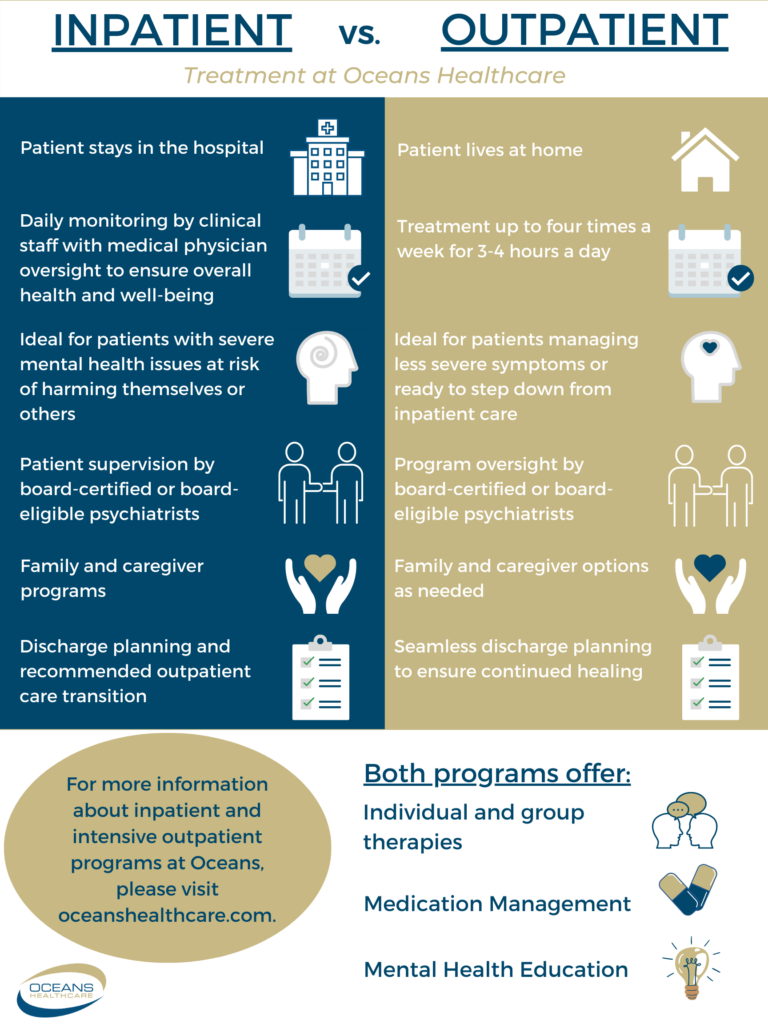What Is Outpatient Mental Health Treatment: A Comprehensive Guide
Outpatient mental health treatment provides therapy without an overnight stay. It offers flexibility for those who need help but have busy lives.
Managing mental health can be challenging. Many people need support but can’t commit to inpatient treatment. Outpatient mental health treatment is a practical solution. It allows individuals to receive professional care while continuing with daily routines. This form of treatment is ideal for those with mild to moderate symptoms.
It can include therapy sessions, counseling, and medication management. Outpatient treatment is designed to help people manage their mental health effectively. It’s an accessible and flexible option for those seeking help. Understanding how outpatient treatment works can guide you in finding the right support.
Outpatient Treatment Basics
Outpatient mental health treatment is a flexible and effective way to get the support you need without staying in a hospital or residential facility. It allows individuals to receive therapy and other services while continuing with their daily lives. This approach can be ideal for those with mild to moderate mental health conditions, offering the benefits of professional care and the comfort of living at home.
What Is Outpatient Care?
Outpatient care involves receiving mental health services without being admitted to a hospital. Patients visit a clinic, therapist’s office, or community health center on a scheduled basis. This type of care is suitable for individuals who do not require 24-hour supervision. Outpatient care offers several advantages:
- Flexibility: Patients can schedule appointments around work, school, and family commitments.
- Cost-effective: Outpatient services are generally less expensive than inpatient care.
- Access to support systems: Patients can maintain their social and family connections while receiving treatment.
Outpatient care typically includes:
- Therapy sessions: One-on-one or group therapy with licensed professionals.
- Medication management: Regular consultations with a psychiatrist to manage prescriptions.
- Support groups: Meetings with peers to share experiences and coping strategies.
Types Of Outpatient Services
There are various types of outpatient services designed to meet different needs. Here are some common options:
- Individual Therapy: One-on-one sessions with a therapist to address personal issues and develop coping strategies.
- Group Therapy: Sessions led by a therapist with a small group of people facing similar challenges.
- Family Therapy: Involves family members in the therapy process to improve communication and resolve conflicts.
- Intensive Outpatient Programs (IOPs): Structured programs that provide more intensive treatment than regular outpatient therapy. IOPs often include multiple therapy sessions per week.
- Partial Hospitalization Programs (PHPs): Day programs where patients spend several hours each day at a treatment center but return home at night.
Each type of outpatient service is designed to cater to different levels of need and personal circumstances. By choosing the right type of service, individuals can receive tailored support that best fits their lifestyle and mental health needs.
Who Can Benefit?
Outpatient mental health treatment offers support for individuals dealing with various mental health issues. It provides therapy, counseling, and other services without requiring an overnight stay. But who can benefit from outpatient mental health treatment? This treatment is ideal for those who need structured support yet want to maintain their daily routines.
Target Populations
Outpatient mental health treatment is suitable for a wide range of people. Several groups can find this form of treatment particularly helpful:
- Adults with Mild to Moderate Mental Health Issues: People experiencing depression, anxiety, or stress can gain from outpatient services. They receive professional help while continuing with their everyday lives.
- Children and Adolescents: Young individuals facing emotional or behavioral challenges benefit greatly. Outpatient treatment allows them to get support without disrupting school or home life.
- Individuals with Substance Use Disorders: Outpatient programs often include substance abuse treatment. They offer counseling and therapy to help individuals overcome addiction.
- Those with Chronic Mental Health Conditions: People managing long-term conditions like bipolar disorder or schizophrenia can also benefit. Regular therapy and medication management are crucial for their well-being.
Outpatient mental health treatment is flexible. It adapts to the needs of different age groups and mental health conditions. Whether you are seeking help for yourself or a loved one, outpatient treatment can be a valuable resource.
Signs You May Need Help
Recognizing the signs that you may need outpatient mental health treatment is crucial. Here are some indicators:
- Persistent Sadness or Anxiety: Feeling sad or anxious most of the time might indicate a mental health issue. If these feelings last for weeks, it’s time to seek help.
- Changes in Sleep Patterns: Trouble sleeping or sleeping too much can be a sign of mental health problems. Both insomnia and hypersomnia are concerns.
- Loss of Interest in Activities: If you no longer enjoy activities you once loved, this could be a red flag. Apathy towards hobbies, socializing, or work is a common symptom.
- Difficulty Concentrating: Struggling to focus on tasks or make decisions can be a sign you need help. Mental health issues often affect cognitive functions.
- Physical Symptoms Without Clear Cause: Chronic headaches, stomachaches, or other physical issues might be linked to mental health. When no physical cause is found, consider mental health treatment.
If you notice any of these signs, seeking outpatient mental health treatment could be beneficial. Early intervention often leads to better outcomes. Don’t wait for symptoms to worsen. Taking action can help you regain control over your life and well-being.
Common Therapies Offered
Outpatient mental health treatment offers support without requiring an overnight stay at a facility. Patients receive care while continuing with daily activities. Common therapies offered in outpatient settings aim to help individuals manage their mental health conditions effectively.
Cognitive Behavioral Therapy
Cognitive Behavioral Therapy (CBT) is a popular treatment in outpatient settings. It focuses on identifying and changing negative thought patterns. The goal is to alter behaviors and emotions linked to these thoughts. CBT is effective for various conditions, including:
- Depression
- Anxiety disorders
- Post-traumatic stress disorder (PTSD)
- Obsessive-compulsive disorder (OCD)
During CBT sessions, therapists use techniques to help patients:
- Identify negative thoughts
- Challenge these thoughts
- Develop healthier thinking patterns
- Practice new behaviors
A typical CBT session structure might include:
| Session Part | Description |
|---|---|
| Introduction | Review previous session and set agenda |
| Main Activity | Work on specific thoughts or behaviors |
| Homework | Assign tasks for practice between sessions |
CBT is often short-term, typically lasting 12-20 sessions. Its structured approach makes it suitable for outpatient care.
Group Therapy Options
Group therapy is another key component of outpatient mental health treatment. It involves multiple patients working together under the guidance of a therapist. Benefits of group therapy include:
- Support from peers
- Learning from others’ experiences
- Improved social skills
- Reduced feelings of isolation
Common types of group therapy include:
- Support Groups: Focus on shared experiences and mutual support.
- Psychoeducational Groups: Provide education on specific conditions and coping strategies.
- Skills Development Groups: Teach practical skills for managing symptoms.
- Therapy Groups: Offer a space to work on interpersonal issues in a therapeutic setting.
Group therapy sessions usually last 1-2 hours and occur weekly. They can be open (new members can join) or closed (same members throughout). The structure of group sessions may include:
| Session Part | Description |
|---|---|
| Check-In | Members share updates |
| Main Activity | Discussion or skill-building exercise |
| Reflection | Members reflect on the session and set goals |
Group therapy offers a unique opportunity to connect with others facing similar challenges, fostering a sense of community and understanding.

Accessing Outpatient Care
Outpatient mental health treatment offers flexibility for those seeking help. Patients can maintain daily routines while receiving the necessary support. Accessing outpatient care involves a few key steps. Finding the right providers and understanding insurance considerations are crucial.
Finding Providers
Finding the right mental health provider is essential for effective treatment. Start by researching available options in your area. Many resources can help you find a suitable provider:
- Online Directories: Websites like Psychology Today and TherapyDen list many mental health professionals.
- Referrals: Ask your primary care physician for recommendations.
- Community Resources: Local community health centers often have lists of mental health providers.
Once you have a list of potential providers, consider the following factors:
- Specialization: Ensure the provider specializes in the area you need help with, such as anxiety, depression, or PTSD.
- Credentials: Verify their qualifications and licensing.
- Experience: Look for providers with experience treating patients with similar issues.
- Availability: Check their availability to match your schedule.
- Approach: Understand their treatment approach and ensure it aligns with your preferences.
Interviewing a few providers can help you find the best fit. Ask about their approach, experience, and how they measure progress. This can ensure you receive the care you need.
Insurance Considerations
Understanding your insurance coverage is vital for accessing outpatient mental health care. Here are a few steps to navigate insurance considerations:
- Review Your Plan: Check your insurance plan to see what mental health services are covered.
- Network Providers: Look for providers within your insurance network to reduce out-of-pocket costs.
- Preauthorization: Some plans require preauthorization for mental health services. Contact your insurance company to confirm.
Here is a table that outlines common insurance considerations:
| Consideration | Description |
|---|---|
| Copayments | The fixed amount you pay per visit |
| Deductibles | The amount you must pay before insurance covers costs |
| Out-of-Pocket Maximum | The most you pay in a year, after which insurance covers 100% |
If your insurance does not cover the needed services, consider these options:
- Sliding Scale Fees: Some providers offer fees based on your income.
- Community Programs: Local non-profits may provide low-cost or free services.
- Employee Assistance Programs: Some employers offer mental health support through EAPs.
Understanding these insurance aspects ensures you get the necessary care without unexpected costs. Always confirm details with your insurance provider to avoid surprises.
Treatment Duration
Outpatient mental health treatment is for those who need help but do not require hospital stays. It provides therapy, medication, and other services while allowing individuals to live at home. Understanding the duration of outpatient treatment is important. It varies based on personal needs and progress.
Typical Timeframes
The duration of outpatient mental health treatment can differ greatly. Some people may need short-term care, while others might require long-term support. Here are some typical timeframes:
- Short-term treatment: This usually lasts for a few weeks to three months. It’s often used for situational issues like grief or a mild anxiety attack.
- Medium-term treatment: This can last from three to six months. It’s common for moderate mental health conditions like depression or anxiety disorders.
- Long-term treatment: This could extend from six months to a year or more. It’s often necessary for severe or chronic conditions like bipolar disorder or schizophrenia.
During these periods, the frequency of sessions can also vary. Some may start with weekly visits and then reduce to bi-weekly or monthly as progress is made. A typical schedule might look like this:
| Duration | Frequency of Sessions |
|---|---|
| 0-3 months | Weekly |
| 3-6 months | Bi-weekly |
| 6+ months | Monthly |
Factors Affecting Length
Several factors can affect how long outpatient mental health treatment lasts. Here are some key elements:
- Severity of Condition: More severe mental health conditions often require longer treatment. For example, chronic depression or PTSD may need extended care.
- Type of Therapy: Different therapies have different timelines. Cognitive-behavioral therapy (CBT) is usually shorter-term. Psychodynamic therapy might take longer.
- Patient Commitment: The more committed a patient is to attending sessions and following the treatment plan, the more effective and potentially shorter the treatment can be.
- Support System: A strong support system, including family and friends, can help speed up recovery. Lack of support might extend the treatment duration.
- Co-occurring Disorders: If a person has more than one mental health issue, treatment might take longer. For example, dealing with both anxiety and substance abuse at the same time.
Understanding these factors helps in planning and setting realistic expectations. A personalized treatment plan is essential. This ensures that each individual’s unique needs are met.

Success Rates
Outpatient mental health treatment helps many people manage their mental health conditions. Success rates in outpatient treatment show how effective these programs can be. But what affects these rates, and how can progress be measured?
Factors Influencing Success
Several factors can influence the success of outpatient mental health treatment. Understanding these factors can help improve treatment outcomes. 1. Patient Engagement: Active participation by the patient is crucial. This includes attending sessions regularly, following the treatment plan, and being open with their therapist.
- Regular attendance
- Following treatment plans
- Open communication
2. Support System: Having a strong support system can greatly impact success rates. Family, friends, and community support can provide motivation and encouragement. 3. Quality of Therapy: The quality of therapy and the therapist’s expertise are essential. A good therapist can make a significant difference in a patient’s progress. 4. Type of Treatment: Different types of therapy work better for different people. Cognitive Behavioral Therapy (CBT), Dialectical Behavior Therapy (DBT), and other approaches can be effective depending on the condition. Other factors include:
| Factor | Impact |
|---|---|
| Medication Adherence | Improves symptom management |
| Therapist-Patient Relationship | Builds trust and openness |
| Socioeconomic Status | Affects access to resources |
Measuring Progress
Measuring progress in outpatient mental health treatment is crucial. It helps to see if the treatment is effective or needs adjustment. 1. Regular Assessments: Regular assessments by the therapist can track changes in the patient’s condition. This may include self-report questionnaires, clinical interviews, and observation.
- Self-report questionnaires
- Clinical interviews
- Observation
2. Goal Setting: Setting specific, measurable goals helps in tracking progress. These goals should be realistic and achievable within a certain timeframe. 3. Feedback from Patients: Patient feedback is valuable. It provides insights into how they feel about their progress and any challenges they face. 4. Behavioral Changes: Noticing changes in behavior is another way to measure progress. Improvements in daily functioning, social interactions, and coping skills indicate positive change. Here are some key metrics to consider:
- Reduction in symptoms
- Improved daily functioning
- Increased social engagement
- Better coping mechanisms
Tracking these metrics can help ensure the treatment is on the right path.
Challenges And Barriers
Outpatient mental health treatment offers support without requiring a hospital stay. People get therapy, counseling, and medication management while living at home. Although helpful, this type of treatment faces many challenges and barriers. Understanding these can help improve access and effectiveness.
Stigma Around Mental Health
One of the biggest challenges is the stigma surrounding mental health. Many people feel embarrassed or ashamed to seek help. This can stop them from getting the treatment they need. Here are some common reasons for this stigma:
- Fear of being judged by others
- Lack of understanding about mental health conditions
- Belief that mental health issues are a sign of weakness
Stigma can lead to:
| Impact | Explanation |
|---|---|
| Delayed Treatment | People may wait too long to seek help. |
| Isolation | Individuals may avoid social interactions. |
| Increased Symptoms | Conditions can worsen without timely treatment. |
Educating the public about mental health can help reduce stigma. Encouraging open conversations can make a big difference.
Logistical Issues
Logistical issues also pose significant barriers to outpatient mental health treatment. These can include transportation, scheduling, and financial constraints. Common logistical barriers are:
- Long travel distances to treatment centers
- Inconvenient appointment times
- High cost of therapy and medications
These barriers can create additional stress for individuals seeking help:
| Barrier | Effect |
|---|---|
| Transportation | Missed appointments due to lack of transport. |
| Scheduling | Difficulty balancing work, family, and treatment. |
| Financial | Struggle to afford ongoing care and medication. |
Improving access to telehealth services can help overcome some of these challenges. Offering flexible scheduling and sliding scale fees can also make a big difference.

Future Trends
Outpatient mental health treatment helps individuals who need mental health support while living at home. It includes therapy, counseling, and medication management. The future of outpatient mental health treatment is evolving with new trends. These trends aim to make treatment more accessible and effective for everyone. Here are some key future trends in outpatient mental health treatment.
Telehealth Expansion
Telehealth is growing quickly in the field of mental health. It uses technology to provide care remotely. This trend offers many benefits:
- Accessibility: People in remote areas can access mental health services.
- Convenience: Patients can attend sessions from home, saving time and travel costs.
- Flexibility: Telehealth allows for more flexible scheduling of appointments.
Telehealth also removes the stigma of visiting a mental health clinic. Patients can feel more comfortable and private during their sessions. This can lead to better outcomes. Here is a table comparing in-person and telehealth mental health services:
| Aspect | In-Person | Telehealth |
|---|---|---|
| Location | Clinic or office | Home or any private place |
| Travel | Required | Not required |
| Cost | Higher | Lower |
| Privacy | Less private | More private |
Telehealth is becoming a standard part of outpatient mental health treatment. Its expansion is expected to continue, making mental health care more inclusive and efficient.
Integrative Approaches
Integrative approaches combine different methods of treatment. This trend aims to treat the whole person, not just the symptoms. Integrative approaches can include:
- Therapy: Cognitive Behavioral Therapy (CBT), Dialectical Behavior Therapy (DBT), and others.
- Medication: Prescribed by psychiatrists to manage symptoms.
- Holistic Practices: Yoga, meditation, and mindfulness.
- Nutrition: Healthy eating plans to support mental health.
These methods work together to improve overall well-being. For example, combining therapy with mindfulness can reduce anxiety and stress more effectively. Here is a list of benefits of integrative approaches:
- Addresses multiple aspects of health.
- Provides a personalized treatment plan.
- Enhances the effectiveness of traditional treatments.
Integrative approaches are gaining popularity. They offer a more comprehensive way to support mental health. As these methods become more widely used, outpatient mental health treatment will continue to improve.
Frequently Asked Questions
What Is Outpatient Mental Health Treatment?
Outpatient mental health treatment involves therapy and counseling sessions without staying overnight. It offers flexibility and allows patients to maintain daily routines.
How Does Outpatient Therapy Work?
Outpatient therapy includes scheduled sessions with a therapist. Patients attend these sessions regularly while continuing their daily activities.
Who Benefits From Outpatient Mental Health Treatment?
Individuals with mild to moderate mental health issues benefit from outpatient treatment. It’s ideal for those who need support but can function in daily life.
What Services Are Offered In Outpatient Treatment?
Outpatient treatment includes individual therapy, group therapy, and medication management. These services help address various mental health concerns.
Conclusion
Outpatient mental health treatment offers flexible and effective care options. Individuals can access therapy without staying overnight. This approach helps people manage their daily lives while getting the support they need. Treatment plans are personalized to fit each person’s unique situation.
This makes mental health care accessible and practical. Remember, seeking help is a sign of strength, not weakness. Consider outpatient treatment if you need mental health support.




